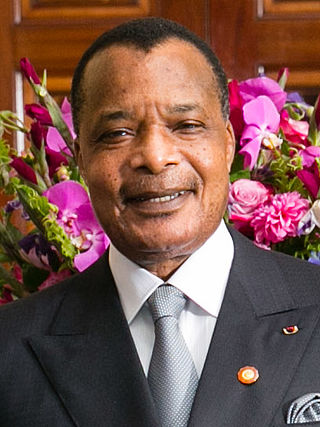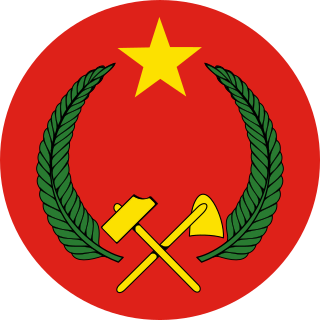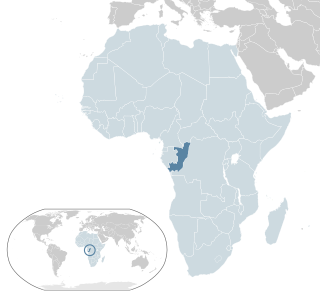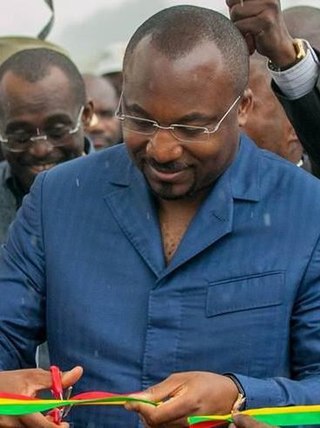
Denis Sassou Nguesso is a Congolese politician and former military officer who became president of the Republic of the Congo in 1997. He served a previous term as president from 1979 to 1992. During his first period as president, he headed the Congolese Party of Labour (PCT) for 12 years. He introduced multiparty politics in 1990, but was stripped of executive powers by the 1991 National Conference, remaining in office as a ceremonial head of state. He stood as a candidate in the 1992 presidential election but placed third.

The Congolese Party of Labour is the ruling party of the Republic of the Congo. Founded in 1969 by Marien Ngouabi, it was originally a pro-Soviet, Marxist–Leninist vanguard party which founded the People's Republic of the Congo. It took a more moderate left-wing stance following the dissolution of the Soviet Union in 1991 and adopted social democracy as its principal ideology in 2006. Denis Sassou Nguesso is the President of the PCT Central Committee, and Pierre Moussa is the Secretary-General of the PCT.

Pierre Oba is a Congolese security official who has served in the government of Congo-Brazzaville as Minister of Mines since 2005. During the 1980s, he served successively as Director of Presidential Security and as Director-General of Public Security. Later, he was Minister of the Interior from 1997 to 2002 and Minister of Security from 2002 to 2005. He is also a Général de Brigade of the National Police.

The Second Republic of the Congo Civil War, also known as the Second Brazzaville-Congolese Civil War, was the second of two ethnopolitical civil conflicts in the Republic of the Congo which lasted from 5 June 1997 to 29 December 1999. The war served as the continuation of the civil war of 1993–1994 and involved militias representing three political candidates. The conflict ended following the intervention of the Angolan military, which reinstated former president Denis Sassou Nguesso to power.

The People's Republic of the Congo was a Marxist–Leninist socialist state that existed in the Republic of the Congo from 1969 to 1992.

Poto-Poto is one of the urban arrondissements (boroughs) of the city of Brazzaville, capital of the Republic of the Congo.

Presidential elections were held in the Republic of the Congo in August 1992, marking the end of the transitional period that began with the February–June 1991 National Conference. It was won by Pascal Lissouba of the Pan-African Union for Social Democracy (UPADS), who defeated Bernard Kolélas of the Congolese Movement for Democracy and Integral Development (MCDDI) in a second round of voting.
François Ibovi is a Congolese politician who held a succession of key posts in the government of Congo-Brazzaville beginning in 1997. Closely associated with President Denis Sassou Nguesso, he was Minister of Communication from 1997 to 2002, Minister of Territorial Administration from 2002 to 2007, First Vice-President of the National Assembly from 2007 to 2012, and Minister of Health from 2012 to 2016.

Congo, officially the Republic of the Congo or Congo Republic, also known as Congo-Brazzaville is a country located on the western coast of Central Africa to the west of the Congo River. It is bordered to the west by Gabon, to the northwest by Cameroon, to the northeast by the Central African Republic, to the southeast by the Democratic Republic of the Congo, to the south by the Angolan exclave of Cabinda, and to the southwest by the Atlantic Ocean.
Antoine Ndinga Oba was a Congolese diplomat, political figure, and linguist. During the single-party rule of the Congolese Labour Party (PCT), he served in the government of Congo-Brazzaville as Minister of National Education from 1977 to 1984 and as Minister of Foreign Affairs from 1984 to 1991. Later, he was Congo-Brazzaville's Ambassador to UNESCO from 1998 until his death in 2005.

Firmin Ayessa is a Congolese politician who has served in the government of Congo-Brazzaville as Deputy Prime Minister for Civil Service, State Reform, Labour, and Social Security since 2017. As a long-time associate of President Denis Sassou Nguesso, Ayessa has held a series of key posts at the Presidency of Congo-Brazzaville; he was Director of the Civil Cabinet of the President from 1999 to 2002, deputy director of the Presidential Cabinet from 2002 to 2007, and he was Director of the Presidential Cabinet from 2007 to 2017.

Raymond Zéphirin Mboulou is a Congolese politician who has served in the government of Congo-Brazzaville as Minister of the Interior since December 2007. Previously, he was Secretary-General of the Presidency from May 2007 to December 2007.
Jean-Marie Tassoua is a Congolese politician. Tassoua was a militia commander during the 1997 civil war and served in the government of Congo-Brazzaville as Minister of Energy and Hydraulics from 1997 to 2002. He has been the President of the Economic and Social Council, a state institution, since 2009 and he was Co-President of the New Democratic Forces (FDN), a political party, from 2007 to 2010.

Édith Lucie Bongo Ondimba was the First Lady of Gabon as the wife of President Omar Bongo from 1989 to 2009.
Jean-Dominique Okemba is a Congolese military and political figure. He has been a special adviser to the President of Congo-Brazzaville, Denis Sassou Nguesso, since 1997, and he has also been the secretary-general of the National Security Council since 2002. He is a nephew of Sassou Nguesso.

Denis-Christel Sassou Nguesso is a Congolese politician. He is the son of President of Congo-Brazzaville Denis Sassou Nguesso. Denis Christel was administrator-general of Cotrade and was subsequently appointed deputy director-general of the National Petroleum Company of the Congo in December 2010. He was elected to the National Assembly of Congo-Brazzaville in 2012.
Jean-Jacques Bouya is a Congolese politician who has served in the government of Congo-Brazzaville as Minister of Spatial Planning and Major Projects since 2012. A pilot by profession, he served as Transport Adviser to President Denis Sassou Nguesso beginning in 1997 and as Delegate-General for Major Projects beginning in 2003.

Charles Richard Mondjo is a Congolese military officer who has served in the government of Congo-Brazzaville as Minister of Defense since 2012. Previously, he was Chief of Staff of the Congolese Armed Forces from 2002 to 2012.

Presidential elections were held in the Republic of the Congo on 20 March 2016. It was the first election to be held under the new constitution that had been passed by referendum in 2015. President Denis Sassou Nguesso, who had exhausted the two-term limit imposed by the previous constitution, was allowed to run again due to the adoption of the new constitution. He won re-election in the first round of voting, receiving 60% of the vote.

Modeste Boukadia is a Congolese political figure and the prominent leader of the self-proclaimed State of South Congo. Known for his active involvement in Congolese politics, Boukadia has been a vocal advocate for political reform and human rights.













